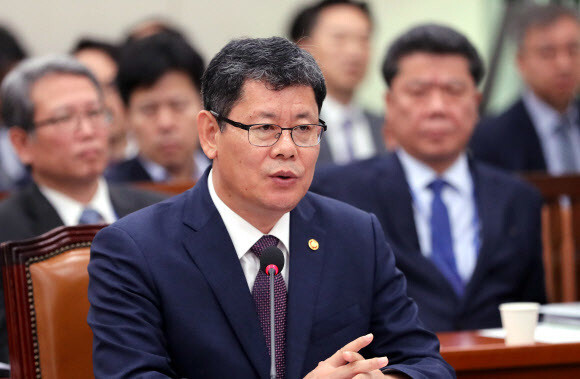hankyoreh
Links to other country sites 다른 나라 사이트 링크
Korea and UNC discuss DMZ access for nonmilitary purposes

The South Korean government and UN Command (UNC) are holding discussions on the UNC’s right to approve or refuse access to the DMZ for nonmilitary purposes, it was revealed on Oct. 22. The discussions appear to be taking place after remarks that the UNC’s disallowance of access even for nonmilitary purposes such as inter-Korean change has an inadequate basis in terms of the Armistice Agreement and requires additional institutional changes.
“Intensive discussions from the working level to the senior level are taking place on different issues and in different channels concerning the issue of [DMZ] access,” said Choi Hyun-soo, spokesperson for the Ministry of National Defense (MND), in a briefing that day.
“They will continue holding close discussions going forward,” she added. At the senior level, chief of the MND national defense policy office and the UNC deputy commander were reportedly participating in the discussions. Sources said the two met in mid-September to discuss forming a senior-level consultative body for DMZ access and other issues.
The South Korean government reportedly plans to focus on institutionalizing regulations concerning access to the DMZ for nonmilitary purposes. The Ministry of Unification (MOU) and other related agencies are also expected to take part in the discussion process, depending on the issues. An MOU official told reporters the same day, “Our emphasis is on institutional measures [for DMZ access].”
“We’re going to be examining standards, procedures, and so forth to be reflected in institutions, regulations, and manuals,” the official said.
During the discussions, the UNC reportedly balked at the idea of allowing DMZ access even for nonmilitary purposes, citing security issues. In particular, it was quoted as voicing concerns about the potential violation of North Korea sanctions with items taken into North Korea over the DMZ’s Military Demarcation Line (MDL). During a parliamentary audit the day before by the National Assembly Foreign Affairs and Unification Committee, Minister of Unification Kim Yeon-chul acknowledged, “There have been differences in opinion [between Seoul and the UNC] concerning access to the DMZ and crossing the MDL.”
The UNC’s controls on DMZ access are based on the Korean Armistice Agreement, which states, “No person, military or civilian, shall be permitted to enter the demilitarized zone except persons concerned with the conduct of civil administration and relief and persons specifically authorized to enter by the Military Armistice Commission.”
“Civil administration and relief in that part of the demilitarized zone which is south of the military demarcation line shall be the responsibility of the Commander-in-Chief, United Nations Command,” the agreement also says. But some argue that the agreement’s reference to “said conditions and terms [being] intended to be purely military in character,” some have contended that it serves as an inadequate basis for the UNC to deny access of a nonmilitary nature.
On Oct. 22, the UNC released a statement claiming that media reports regarding the UNC’s control of the DMZ are “inaccurate,” adding that it approved more than 93% of the approximately 2,200 requests it received for access to the DMZ in 2018.
By Yoo Kang-moon and Lee Je-hun, senior staff writers
Please direct comments or questions to [english@hani.co.kr]

Editorial・opinion
![[Column] Season 2 of special prosecutor probe may be coming to Korea soon [Column] Season 2 of special prosecutor probe may be coming to Korea soon](https://flexible.img.hani.co.kr/flexible/normal/500/300/imgdb/original/2024/0426/3317141030699447.jpg) [Column] Season 2 of special prosecutor probe may be coming to Korea soon
[Column] Season 2 of special prosecutor probe may be coming to Korea soon![[Column] Park Geun-hye déjà vu in Yoon Suk-yeol [Column] Park Geun-hye déjà vu in Yoon Suk-yeol](https://flexible.img.hani.co.kr/flexible/normal/500/300/imgdb/original/2024/0424/651713945113788.jpg) [Column] Park Geun-hye déjà vu in Yoon Suk-yeol
[Column] Park Geun-hye déjà vu in Yoon Suk-yeol- [Editorial] New weight of N. Korea’s nuclear threats makes dialogue all the more urgent
- [Guest essay] The real reason Korea’s new right wants to dub Rhee a founding father
- [Column] ‘Choson’: Is it time we start referring to N. Korea in its own terms?
- [Editorial] Japan’s rewriting of history with Korea has gone too far
- [Column] The president’s questionable capacity for dialogue
- [Column] Are chaebol firms just pizza pies for families to divvy up as they please?
- [Column] Has Korea, too, crossed the Rubicon on China?
- [Correspondent’s column] In Japan’s alliance with US, echoes of its past alliances with UK
Most viewed articles
- 1AI is catching up with humans at a ‘shocking’ rate
- 2After election rout, Yoon’s left with 3 choices for dealing with the opposition
- 3Is Japan about to snatch control of Line messenger from Korea’s Naver?
- 4South Korea officially an aged society just 17 years after becoming aging society
- 51 in 5 unwed Korean women want child-free life, study shows
- 6[Column] ‘Choson’: Is it time we start referring to N. Korea in its own terms?
- 7Korea’s 1.3% growth in Q1 signals ‘textbook’ return to growth, says government
- 8No good, very bad game for Korea puts it out of Olympics for first time since 1988
- 9[Editorial] Japan’s rewriting of history with Korea has gone too far
- 10Why Korea shouldn’t welcome Japan’s newly beefed up defense cooperation with US